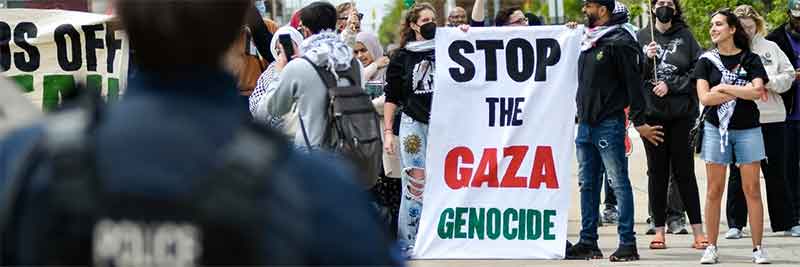
The justifications used to defend police actions against Columbia University students advocating for Palestine evoke a disheartening sense of déjà vu. Instead of reflecting progress, they remind us that old patterns persist. Mayor Eric Adams of New York City invoked the specter of “Outside Agitators” to justify the crackdown, suggesting that external influences manipulated the student movement into extremism. This narrative implies a lack of independent thought or agency among the students, reminiscent of outdated stereotypes.
Adams, as a Black man leading a major Northern police force, seemingly regressed to a bygone era, adopting a response rooted in fascist and segregationist ideologies. By attributing the students’ actions solely to external manipulation, he undermined their autonomy and dismissed their legitimate grievances.
This rhetoric implies that individuals cannot think for themselves or discern their own feelings and perceptions without external influence. It portrays them as passive subjects to be controlled, devoid of agency. Such a stance is not only patronizing but also denies the fundamental rights of individuals to express dissent and seek justice autonomously.
People worldwide, including Jewish organizations, have witnessed with horror the unfolding events in Gaza and the Occupied Territories. The death toll, exceeding 35,000 Gazans, the majority of whom are civilians and children, has appalled observers. Daily reports emerge of Israeli Defense Forces and Jewish settlers targeting Palestinians in the West Bank, exacerbating the humanitarian crisis. Instances of starvation and the near-destruction of health services due to Israeli military actions further compound the tragedy. Journalists and humanitarian workers have not been spared, with targeted killings adding to the sense of outrage.
Despite these atrocities, the response from the US administration and its politicians has been disheartening. Initially denying the extent of the devastation, casting doubt on casualty counts, and vetoing condemnations at the UN, they have actively minimized criticism of Israel. This complicity in enabling death and destruction in Gaza has only fueled global outrage, intensifying protests on US campuses and beyond.
Despite admonishments from the US administration to exercise caution in civilian areas, the government has consistently provided Israel with weapons and $17 billion in supplemental aid to prosecute the war. This support, in apparent contradiction of the Leahy Law, named after former US Senator Patrick Leahy, raises serious concerns. The law stipulates that military assistance should be withheld from forces engaged in human rights violations. The ongoing excessive death
toll, destruction, and extrajudicial killings in the West Bank clearly constitute gross violations of human rights. Yet, successive administrations, including the Biden administration, have continued to flout their own laws by maintaining support for Israel.
As the public has observed and rallied against the ongoing conflict, outrage has mounted over the Biden administration’s steadfast support for the war, seemingly disregarding public opinion.
Recent polls reflect a clear disapproval of Israel’s actions in Gaza, with 55% of Americans expressing dissent compared to 36% in approval. This widespread discontent underscores the growing frustration among the populace. People are not passive bystanders; they perceive the realities of the situation and experience the emotions it evokes.
Meanwhile, students on US campuses have also been attentive to the unfolding events. Despite their vocal opposition, advocacy, and demonstrations, their voices have often been stifled.
Censorship has been rampant, with organizations such as Jewish Voices for Peace, If Not Now, and Students for Justice in Palestine facing bans on numerous campuses. Rather than engaging with their concerns, Zionist and status-quo politicians have resorted to condemning these groups, alleging influence from “Outside” forces and treating them as unruly children in need of discipline. However, the people have seen and felt the injustices firsthand, rendering them unable to remain silent. They refuse to be dictated to by external actors and do not require validation from “Outside Agitators” to affirm their convictions.
Throughout history, college students have been at the forefront of driving societal change. They infused the civil rights movement with vital energy, standing against segregation and advocating for equality. Similarly, during the Vietnam War, it was students who courageously protested against an unjust conflict, demanding an end to violence and imperialism.
In the Free South Africa Movement, students played a pivotal role in raising awareness about apartheid and advocating for divestment from institutions supporting the oppressive regime. Today, the tradition of student activism continues, with students advocating for justice in Palestine. They are questioning the investments of their universities and demanding accountability for where their schools’ dollars are allocated.
These students understand the adage, “he who pays the piper calls the tune,” recognizing the influence of financial interests on institutional decisions. Contrary to the narrative of “Outside Agitators” shaping their activism, these students are informed and empowered by their own convictions and understanding of systemic injustices. Their activism stems from a deep commitment to justice and a recognition of their role in effecting meaningful change.
Listening to Mayor Adams, I couldn’t shake a feeling of déjà vu. His rhetoric transported me back to the dark days of the 1940s, 50s, and 60s, when segregationists peddled the notion that
their African American constituents were content until outside agitators from the North stirred up trouble. The insinuation was clear: people were supposedly happy and complacent until someone came along and told them they should be discontent. These “outside agitators” purportedly pointed out where people hurt, how they hurt, and what they should do about it. The implication was that African Americans were content and satisfied until someone convinced them otherwise.
This paternalistic view of people and their grievances is deeply troubling. It suggests that individuals are incapable of recognizing their own feelings until someone dictates them. It reinforces the idea that those in power are the ultimate authority on what people should think and feel. Any deviation from this prescribed narrative is dismissed as the influence of “outside agitators.”
As a Black man, Mayor Adams should be acutely aware of this historical context and the way certain phrases have been weaponized. His words echoed the sentiments of segregationists and fascists, a stark reminder that these harmful ideologies have not been relegated to the past as we might hope.
I can’t help but draw parallels between their dismissive attitudes towards dissent and the historical oppression experienced by groups like the Black Panther Party (BPP).
The suggestion that individuals are incapable of independent thought and easily manipulated by external forces mirrors the way the US government viewed the BPP during the civil rights era. Just as the BPP was portrayed as unable to comprehend their own experiences and emotions without outside influence, contemporary activists advocating for justice face a similar lack of recognition for the legitimacy of their grievances. The portrayal of dissenters as childlike or ignorant echoes the paternalistic attitudes prevalent during chattel slavery and segregation. Like African Americans of the past, contemporary activists are confronted with attempts to undermine their agency and dismiss their demands for justice.
However, I firmly believe that such tactics are ineffective in today’s context. We, as individuals, speak from a position of emancipation and are educated with principles of justice and fairness. Despite attempts to silence us, we refuse to be treated as subservient, demanding recognition of our rights and experiences.
Another offensive assertion is the insinuation that people are being manipulated by Hamas or Iran. This accusation mirrors the tactics used by segregationists and status-quo politicians during the Civil Rights Movement of the 1940s, 50s, and 60s. At that time, the movement was often vilified as being sponsored, utilized, and controlled by communists. The underlying implication was that individuals couldn’t possibly be genuinely upset or agitated unless they were being influenced by external forces.
While the specific actors of deceit and manipulation may have shifted from communists to HH and Iran, the underlying message remains the same. It suggests that people are incapable of independent thought and that their emotions are easily manipulated. This dismissive attitude undermines the legitimacy of genuine grievances and denies individuals agency over their own beliefs and actions.
As I listen to these phrases being used, particularly as a Black man, I can’t help but recognize the underlying message these so-called leaders and politicians are conveying: that we are somehow akin to children. According to them, we lack the experiences or knowledge necessary to comprehend our own feelings or perceptions of the world. Instead, they demand that we see the world through their lens, accepting what we are told without question.
This mentality may have been effective on plantations where individuals were subjected to chattel slavery or during the brutality of segregation. However, we are no longer in those
oppressive environments. We speak from a position of emancipation and are educated with principles of justice and fairness. We refuse to be treated as subservient or ignorant beings.
As human beings, we demand that democratic institutions uphold their promise of true democracy, listening to the voices of all its citizens, not just those with wealth and power. We assert our right to form our own opinions, grounded in our experiences and understanding of the world.
As police dismantle encampments and President Biden emphasizes speeches on law and order, these actions may appear superficial, but they carry dangerous implications. They divert attention from the urgent need for deeper and more meaningful discussions about democracy. What does genuine democracy entail? Why are certain voices heard and valued while others are marginalized and ignored? Why is the suffering of some deemed more significant than that of others?
Subscribe to Our Newsletter
Get the latest CounterCurrents updates delivered straight to your inbox.
We refuse to be patronized or silenced by the rhetoric of “Outside Agitators” dictating our perceptions and emotions. The killing of innocent children and civilians is unequivocally wrong, regardless of attempts by the political elite to diminish our concerns and coerce us into compliance. We recognize the atrocities of death and genocide, and we know who is perpetrating these injustices.
It is imperative that we engage in authentic dialogue about the principles of democracy, equity, and justice. We must challenge systemic inequalities and advocate for the rights and dignity of all individuals, regardless of their background or circumstance. Only through collective action and solidarity can we confront and dismantle the structures of oppression that perpetuate injustice and suffering.
Rev. Graylan Scott Hagler is an advisor with FOR-USA and the founder and president of Faith Strategies USA. Until retiring from his position in 2022 Hagler was Senior Minister at Plymouth Congregational United Church of Christ in Washington, D.C.
















































